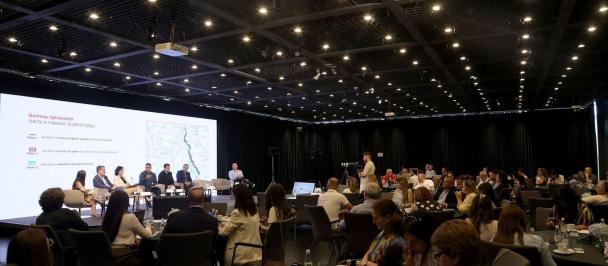A three-day training was held in Sarajevo on the topic of the practical application of the Intergovernmental Panel on Climate Change (IPCC) guidelines and software for creating a greenhouse gas (GHG) inventory
Support for the improvement of the greenhouse gas inventory framework in Bosnia and Herzegovina
July 4, 2024

Participants of the three-day training
A three-day training was held in Sarajevo on the topic of the practical application of the Intergovernmental Panel on Climate Change (IPCC) guidelines and software for creating a greenhouse gas (GHG) inventory, especially in the land use and land use change and forestry (LULUCF) sector. The training was attended by representatives of hydrometeorological institutes, statistical agencies, environmental protection funds and forestry experts, as well as other institutional partners involved in the process of creating the greenhouse gas inventory in Bosnia and Herzegovina.
The aim of the training is to improve and build the necessary capacities in the automation of emission estimates, i.e. GHG removal, and better preparation for the GHG inventory in order to meet the requirements of the Enhanced Transparency Framework (ETF). The GHG inventory plays a key role in monitoring emissions and their removal, contributing to global efforts to stabilize greenhouse gas concentrations.
According to expert Iordanis Tzamtzis, BiH has good prerequisites for creating and improving greenhouse gas inventories, satisfying the level of required data as well as domestic experts who can perform complex calculations of GHG inventories in the LULUCF sector.
"Certain challenges exist in coordination between institutions, institutional settings and responsibilities that are currently not clear. "Also, it is necessary to continuously increase capacity and knowledge in order to bring the inventory calculation to a satisfactory level and to better represent the actual state of GHG emissions in Bosnia and Herzegovina."Iordanis Tzamtzis, expert
During the training, institutional arrangements, data management, quality assurance and risks in the context of reporting in the subject area were discussed. It is an integral part of the support to developing countries for the transition to biannual transparency reports.
"This training is very important for Bosnia and Herzegovina, because it improves the effective management of climate policies, contributes to sustainable development and helps the country fulfill its international obligations. By implementing activities of this type, institutional partners, and experts in BiH are enabled to better understand methodologies and techniques for collecting accurate and relevant data on land use, changes in land use and forestry."Aldin Međedović, 5NC project leader
The training was organized as part of the UNDP in BiH project "Preparation of the Fifth National Report of Bosnia and Herzegovina and the First and Second Biennial Reports on Transparency as Combined Reports according to the UNFCCC (5NC)", and in cooperation with the Global Support Program for Transparency Capacity Building Initiative (CBIT), the United Nations Environment Program (UNEP) and the Food and Agriculture Organization of the United Nations (FAO).
The 5NC project financed by the Global Environment Facility (GEF) and implemented by UNDP in Bosnia and Herzegovina is aimed at strengthening the capacity of institutional partners and improving the framework for the inventory of greenhouse gases in Bosnia and Herzegovina and fulfilling the obligations of Bosnia and Herzegovina from the United Nations Framework Convention on Climate Change (UNFCCC).

 Locations
Locations



